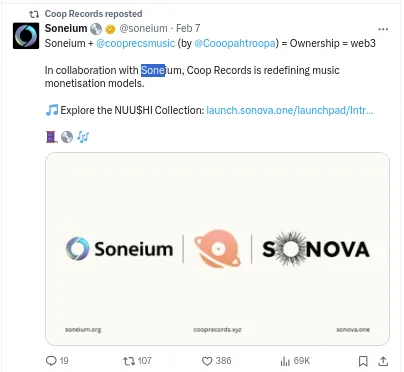NFTs are making a measured return to the music industry, shifting away from speculative trading and toward more practical applications.
The initial NFT boom of the early 2020s saw celebrities and musicians profit from the trend before the market collapsed, leaving assets like Justin Bieber’s $1.3 million Bored Ape NFT devalued to just $69,000. Now, companies are revisiting Web3 technology with a renewed focus on utility, aiming to create sustainable ways for artists to engage with fans.
Industry Adapts to a New NFT Model

Rather than treating NFTs as volatile digital assets, the music industry is incorporating them as tools for fan engagement. Newer NFT models emphasize exclusive content, membership perks, and digital collectibles that provide fans with unique experiences beyond traditional music consumption.
Several companies are already leveraging NFTs for direct artist-to-fan relationships. Web3 label Coop Records, for example, is introducing NFT-based music releases that prioritize accessibility over high-value resale. Unlike past NFT projects that sought quick profits, these initiatives allow artists to foster dedicated communities while maintaining control over their creative output.
NFTs are also playing a role in event-based fan engagement. Some artists and labels are experimenting with limited-edition NFTs tied to concerts, special releases, or anniversaries, functioning as digital memorabilia rather than speculative investments. These offerings mark a shift in how NFTs are marketed—focusing on experiential value rather than financial returns.
The Growing Role of Blockchain in Music
As speculation diminishes, blockchain advocates are reframing NFTs as infrastructure rather than financial assets. Cherie Hu, founder of music industry research firm Water & Music, emphasizes that NFTs allow artists to develop dynamic membership models using blockchain-powered smart contracts. Unlike traditional fan clubs, which are often disjointed and platform-dependent, blockchain-based memberships offer direct, long-term engagement with superfans.
David Greenstein, CEO of blockchain startups Sound and Vault, underscores the importance of innovation in this space. His company Vault has consciously avoided branding itself around NFTs, instead focusing on practical applications for fan interaction. “Nobody asks what the tech stack of Spotify is; they just use the product,” he says, noting that broad adoption will depend on making blockchain functionality seamless for users.
Despite these strategic shifts, the NFT market still faces hurdles. Coop Records founder Cooper Turley acknowledges the difficulties of tokenized monetization for artists, pointing to a lack of best practices and misalignment between investor expectations and actual revenue streams. Moreover, the broader NFT sector saw a 19% drop in trading volume in 2024, highlighting ongoing skepticism about its viability.





